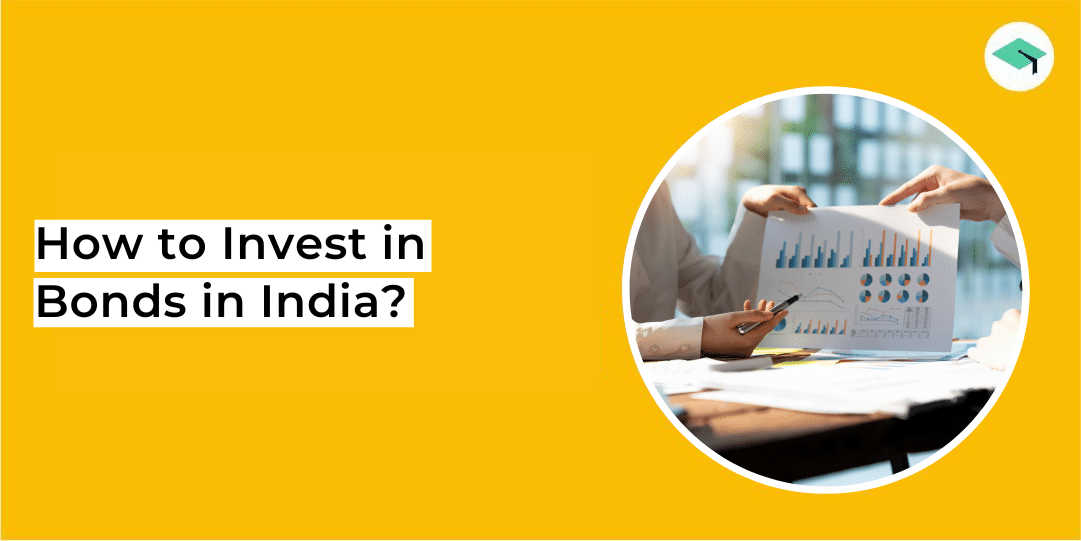A bond is a debt instrument that an investor purchases from the issuer and receives interest on it periodically. Financial institutions, companies, banks, non-banking financial companies, and the government provide bonds.
Bond is one of the financial instruments that help companies finance themselves; it acts as a loan for these companies that raise money directly from investors.
Bonds are ideal for investors seeking low-risk investments, and they carry lower risk than equities and help diversify the portfolio.
What are some primary differences between bonds and stocks?
| Bonds | Stocks |
| In bonds, you provide an amount to the lender to invest in an organization/ government | In a share, you own a portion of the company equity by investing. |
| The person who invests in a bond receives a fixed interest over time from the issuer. | An individual dealing in stocks sells the shares once the price rise. |
| These are a debt. The long-investment bonds are riskier. | These investments are long-term and short-term. Long-term offers the potential to the investor. |
| Safer investment option than stocks | Profitable investment option than bonds |
However, bonds are not entirely free from risks. If the company goes bankrupt, the investors stop receiving interest payments.
In many cases, individuals do not get the principal amount as well. It is thus advisable to invest in bonds in India carefully.
Analyze the growth and issuer’s creditworthiness. Companies with AAA ratings like HDFC Bank Limited or Infosys are considered the best bond issuer.

How to Invest in Index Funds?
What are the 5 types of bonds to invest in India?
Here are the top 5 bond types of investing in India:
- Government security bonds
The Government of India issues this debt instrument. These are one of the safest bonds in India, and they do not carry any credit risk and pay interest semi-annually.
- Corporate Bonds
Firms provide these bonds to individuals for a fixed period, and the account holder earns consistent interest over time. However, companies use the money to fund their business requirements; hence, these are highly risky.
- Zero Coupon Bond
A Zero-Coupon Bond is a pure discount bond. In this, individuals do not receive interest or any benefit until the bond’s maturity.
- Convertible Bond
It is a hybrid bond that acts both as equity and bond. However, it does not happen simultaneously, allowing the investor to convert a bond into equity and qualify for shareholder benefits.
- RBI Bonds
It is also known as a Floating Rate Savings Bond (RBI). Released in 2020, the government pays interest every six months on the bond, and one has to repay the bond post 7 years of expiry.
Is Investing in a Bond beneficial?
Here are some popular benefits of investing in a bond:
- Provides investors with a steady income source
- Flexibility to receive interest income or receive both cumulative interest and principal on maturity
- Some bonds offer tax benefits on returns and interests
- Investors receive benefits from preserving or increasing the investments
- Investors share a higher priority claim to assets in comparison to stockholders
7 Tips to Choosing the right bond
Individuals often dwindle between the right bond and a profitable bond. Here is how you must pick the bond:
- Define your investment objectives
- Analyze your risk-taking abilities
- Identify the bond provider rating
- Expected yield on the bond
- Research the bond’s strengths, weaknesses, and future scope
- Read the terms in fine print carefully
- Decide whether a long-term investment is ideal for you.
How to invest in bonds in India?
One can invest in bonds through a primary or secondary market. In the primary market, an investor can invest in bonds issued by big companies. In this, the companies provide bonds to build capital.
They release IPO (Initial Public Offering) to raise funds for generating capital. When a company raises capital from the market to expand its business or growth, it is termed an IPO.
In contrast, a secondary market exchange refers to organizations like NSE (National Stock Exchange) and BSE (Bombay Stock Exchange). Investors buy and sell stocks by operating in any of these organizations independently.
If you need a pre-mature exit, you can view a secondary market.
In the primary market, an individual has to undergo a documentation process to invest in bonds in the DEMAT account.
Purchasing a bond in the primary market is subjected to strict screening. The company offering securities reviews it and creates a prospectus outlining the details of the securities. In opposition, the secondary market offers more flexibility in trading.

Ways to invest:
- By Connecting with a Bond Broker
Connecting with an authentic broker is one of the ways to choose and invest in the right bonds. Fees may vary from broker to broker.
- Invest through Institutional Investors
In this, investors bids on government securities. The yield on the bond is less than the interest rate one receives. But a higher bid rate makes it profitable.
- Purchasing Mutual Funds and ETFs
It is among the best and fastest methods for bond investing. The provider provides the best ETFs (Exchange Traded Funds) on your behalf.
- Buying Bonds through RBI retail
If you are seeking government securities to invest in, you can do so through RBI retail. Register for a GILT security account under RBI. An investor needs to update the dashboard post-logging:
- An investor must update details like- issue size, date of bidding, price per security, and bid value range
- Place the bid by mentioning the investment value and security
- Complete the payment
